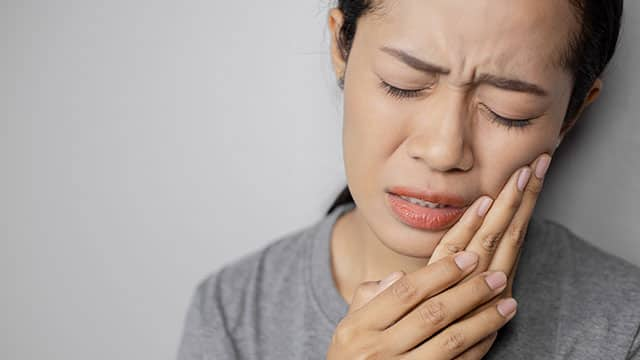Teeth Grinding
Many people grind their teeth and don't even realize it. This condition—called bruxism—can affect people of all ages. Teeth grinding can damage your teeth and cause jaw pain because teeth grinders often apply too much pressure to the teeth. Some people grind their teeth when they feel stressed. Practicing stress-relieving exercises or wearing a mouthguard at night are only some of the ways to stop grinding. Talk to your dental hygienist or dentist if you're concerned you are grinding your teeth day or night.
Temporomandibular Disorder (TMD)
Temporomandibular joints (TMJ) are the joints that allow your mouth to open and close. Temporomandibular disorder (TMD) happens when your joints function improperly, creating symptoms like pain in the sides of your face and jaw. This disorder can also cause the jaw to make a clicking sound when opening the mouth or chewing.
There are several approaches your dentist may take to relieve pain from TMJ, including simple changes in eating habits, exercises, medication, or orthodontic treatments.
Osteomyelitis
According to the Mayo Clinic, osteomyelitis is an infection that has traveled through the body's bloodstream affecting an individual's bones and surrounding tissues. Osteomyelitis in the jaw can affect the TMJ, causing pain in the cheekbones and jaw, fever, or swelling. Fortunately, a series of antibiotics or a surgical procedure to remove the bone's severely infected areas can cure osteomyelitis.
Abscessed Tooth
When the dental pulp or nerve inside your tooth gets infected, an abscess may develop. The bacteria from the infection can spread from the tooth's root to surrounding bone and tissues, causing jaw or facial pain. Keeping regular dental exams and promptly treating any dental cavities is the best way to quickly avoid or treat an abscess.
Other Potential Causes of Jaw Pain
Even when ailments like gum disease or cavities don't directly affect the jaw, pain from these infections can spread or be felt around your face or jaw. Practicing proper oral hygiene at home and keeping regular dental appointments can help reduce your risk of developing any of these conditions.
According to the American Dental Association (ADA), the following issues can cause jaw, face, or chin pain:
- Arthritis
- Sinus problems
- Jaw injury
- Infection
- Periodontal disease
- Toothache
As you can see, pain in your cheekbones, jaw, or chin can have many causes. All of these issues can be treated successfully by a healthcare professional but need to be diagnosed quickly. To determine your pain's exact source, schedule an appointment with a dental professional for a thorough examination.
This article is intended to promote understanding of and knowledge about general oral health topics. It is not intended to be a substitute for professional advice, diagnosis or treatment. Always seek the advice of your dentist or other qualified healthcare provider with any questions you may have regarding a medical condition or treatment.
ORAL HEALTH QUIZ
What's behind your smile?
Take our Oral Health assessment to get the most from your oral care routine
ORAL HEALTH QUIZ
What's behind your smile?
Take our Oral Health assessment to get the most from your oral care routine















